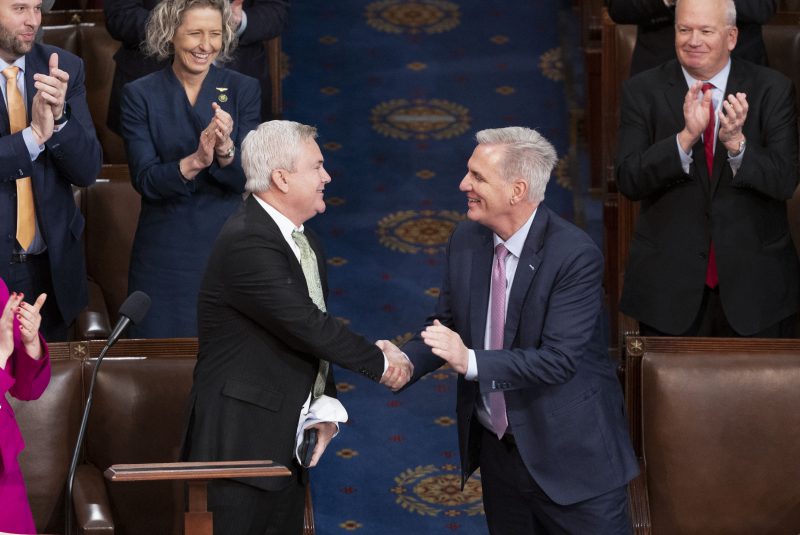Eight years ago, Rep. Kevin McCarthy drew extensive condemnation from his fellow Republicans for a move that might have cost him his bid to succeed John A. Boehner as House speaker. McCarthy drew a line between the Benghazi investigation and Hillary Clinton’s declining poll numbers. Among those rebuking him: the chairman leading the investigation.
On Monday, the Republican congressman leading an investigation into the Biden family’s finances made somewhat similar comments, connecting his probe to President Biden’s poll numbers.
Appearing early Monday morning on Fox News, House Oversight Committee Chairman James Comer (R-Ky.) suggested that the mainstream media couldn’t ignore the investigation because of the impact it was having on Biden’s 2024 standing.
“So do you think that because of your investigation, that is what’s moved this needle with the media?” the host asked Comer.
“Absolutely. There’s no question,” Comer said. “You look at the polling, and right now Donald Trump is seven points ahead of Joe Biden and trending upward; Joe Biden’s trending downward. And I believe that the media is looking around, scratching their head, and they’re realizing the American people are keeping up with our investigation.”
(Comer is referring to Trump’s best recent 2024 poll; most polling shows the race remains competitive.)
The comments hark back to what McCarthy said in 2015 as he was pitching himself for speaker.
In an appearance that was also on Fox News, McCarthy credited his creation of a Benghazi select committee with tarnishing Clinton’s brand.
“Everybody thought Hillary Clinton was unbeatable, right?” McCarthy said. “But we put together a Benghazi special committee, a select committee. What are her numbers today? Her numbers are dropping. Why? Because she’s untrustable.”
Republicans quickly distanced themselves from the remark. Jason Chaffetz (R-Utah), who was the Oversight Committee chairman then, called on McCarthy to apologize for his “absolutely inappropriate statement.” The Benghazi committee chairman, Trey Gowdy (R-S.C.), reflected later to The Washington Post that McCarthy had apologized profusely to him by early the next morning. “Kevin is a friend, which makes the disappointment, frankly, even more bitter,” Gowdy said.
McCarthy dropped out of the speakership race a little more than a week later.
There are arguably some differences between McCarthy’s and Comer’s comments.
One is that Republicans eight years ago weren’t worried only about making the Benghazi committee’s work look political; they had also argued that the investigation wasn’t necessarily about Clinton’s actions specifically, but instead about getting to the bottom of the deaths of four Americans in Libya. (“This investigation has never been about former Secretary of State Clinton and never will be,” Boehner said then.) The Biden probe, by contrast and by definition, is clearly about Biden.
But the larger fear was that this would undermine the committee’s work by making it look like a political effort. As Rep. Darrell Issa (R-Calif.), a former chair of the Oversight Committee, said at the time: “Any ancillary political activity that comes out of it is, in fact, not the goal of the committee and is not what the committee is seeking to do.”
In other words, they feared that talking about poll numbers at all would look as if they were giving away the game.
The final report from the Benghazi committee found no new evidence of wrongdoing by Clinton, though the investigation helped uncover her use of a private email server, which led to a federal investigation that didn’t result in charges. The Biden probe has thus far featured lots of big claims with little in the way of proof, particularly of Biden’s knowledge of his family’s business deals or benefit from them.
Comer’s new comments could be understood as merely an analysis of the circumstances under which the investigation has received more attention. McCarthy spoke somewhat more directly about setting up the committee and the political impact it had, even apparently looking for credit for wielding an investigative tool for political gain. But Comer also clearly alluded to the political gain from his probe, connecting it to people keeping up with the investigation and that being reflected in the polls.
This is also not the first time Comer or another top House Republican chairman has spoken about such probes in the context of the 2024 race.
Comer has repeatedly connected his investigations to Biden’s deliberations about running for president, suggesting it might affect Biden’s calculus. He also acknowledged in a New York Times article about him that it would be more politically difficult to investigate Trump’s son-in-law, Jared Kushner, over his foreign business dealings.
And last summer, at the Conservative Political Action Conference in Dallas, the current House Judiciary Committee and “weaponization” subcommittee chairman, Jim Jordan (R-Ohio), said the investigations would help lay out the stakes in 2024.
“All those things will be investigated just so you have the truth,” Jordan said, “plus that will help frame up the 2024 race, when I hope and I think President Trump is going to run again, and we need to make sure that he wins.”
